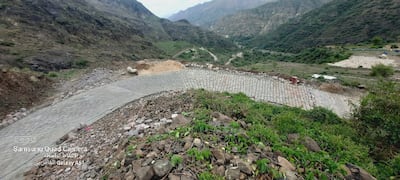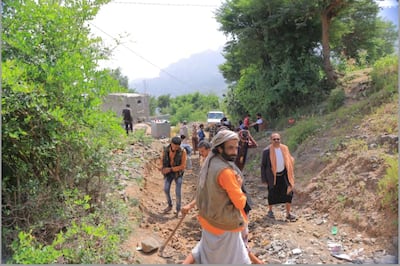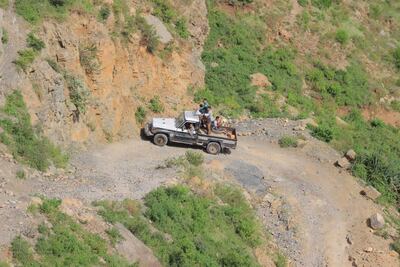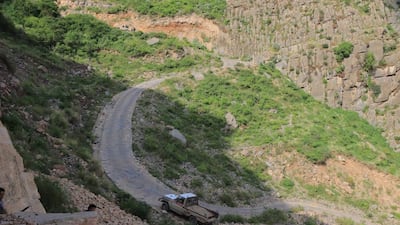In 2011, 27-year-old Samira Al Shalafi embarked on a journey most young pregnant women expect to end with their newborn in their arms.
But the ambulance transporting Samira from her hometown of Al Amarnah to the nearest hospital took too long. After more than two-and-a-half hours in labour in the back of the ambulance, she eventually reached the hospital, but died giving birth to her first child, Faisal.
“Under heavy rain, the 38km trip took double the time, at least two-and-a-half-hours, traversing the steep, mountainous terrain. It was too much for her weak body,” Samira’s mother, who raised Faisal, told The National.
The notoriously dangerous road was the only route connecting Samira's home, the rural area of Al Amarnah, with the city of Al Udayn, in the inland governorate of Ibb in southern central Yemen.
More than 100 people have died from an estimated 70 fatal accidents on the road to Al Udayn, which hosts the nearest hospital to Al Amarnah, according to local residents.
“I lost my father, my cousin and a friend when the car overturned from the top of the mountain as the driver tried to avoid the pits caused by floods,” Al Amarnah resident Ibrahim Abdo Qaed, 19, told The National.

The rural district has a growing population – locals estimate there are now 12,000 people, up from about 3,200 listed in the last official census in 2004.
But for years, they faced a perilous journey across poorly kept mountainous roads to access essential services in Al Udayn.
This is why Ibrahim volunteered in an initiative to build a road connecting their remote village to the city of Al Udayn.
The project was launched in 2016 by the Friends of Nasser Al Majidi initiative. Inspired by the death of Samira, this humanitarian, community-driven effort to improve living conditions was first conceived by Aly Al Amrany in 2011, but was implemented years later by Nasser, a Yemeni expatriate living in Saudi Arabia.
“The lack of services, the high cost of living, the dropout of girls from education, and youth migration underline the urgent need to improve infrastructure,” Nasser told The National.
Ibrahim added: “Our region is neglected because it is far from the urban capital.”
The war in Yemen has also exacerbated the needs of the local population since the Houthis took over the capital Sanaa in 2014. The Houthis have controlled Ibb province since 2015.
While Ibb has not experienced major battles since then, there has been an increase in levels of violence around Ibb City and its easternmost districts while under Houthi control, according to crisis mapping project ACLED.
There were nearly 1.9 million people in need of assistance in Ibb, or about 57 per cent of the population, as of December last year, said the UN Office for the Co-ordination of Humanitarian Affairs.
Against this backdrop, volunteer projects such as the Friends of Nasser Al Majidi road have taken on extra importance in providing a lifeline for residents.

A road to safety and cohesion
Approximately 2.25km of the 6.25km road has been paved so far at a cost of 175 million Yemeni Riyals ($700,000), said Nasser.
“The paving continues whenever sufficient donations are collected,” he said.
It all started when Nasser created a WhatsApp group with five Yemeni expatriates in Saudi Arabia belonging to prominent tribes in Al Amarnah region. Within three months, 300 members joined the initiative, Nasser said.
“We formed a management team of 12 people elected by the citizens of the village, and were able to implement the project with the expert consultation of road engineers,” he said.
The goal, he said, was to link the three governorates of Ibb, Taiz and Al Hudaydah. The road would join Shara'b Al Salam in Taiz, to Al Adain, Al Amranah, Al Shalif and Al Sarra in Ibb.
Local authorities are behind the project.
“We fully support these community initiatives that support the state as it struggles under the shadow of the war,” Ibrahim Al Shami, Ibb’s director of public works and transport, told The National.
While local authorities have not contributed to the construction, Mr Al Shami’s team of engineers have played a supervisory role for quality control.
“Despite the difficulty of working in this mountainous environment, the road they built abides by all safety standards,” said Mr Al Shami.

Social solidarity
Ibrahim Abdo Qaed says that volunteering to build the road was partly to honour the memory of those who have died.
The project has had an even broader social impact, employing 160 workers, including Bassam Al Aqili, 33.
“The project was an opportunity for the unemployed. With a regular income, we did not need to migrate,” Bassem told The National.
For Lutf Al Hamidi, who also worked on the road construction, it was the suffering that motivated him.
“It was torture to visit our families in the village in the rainy season, when no transportation is available,” he told The National. “For decades our pleas for a safe road fell on deaf ears, so I was more than happy to contribute to this project which truly brought the community together.”
The road played in key role in helping the region to flourish socially and economically, he said.
“Sporting activities were made possible with neighbouring villages,” Lutf added.
Women’s contributions
For some women in the community, the road was a tribute to the memory of their loved ones, such as the wife and daughter of Abdo Qaed, Ibrahim Abdo Qaed’s father, which drove them to contribute their precious gold for the cause.
In the case of Halima Al Dhaifani, her decision to donate was an act of solidarity with her friends and neighbours and a bid to end the accidents.
“Even though I didn’t lose anyone, when I heard that the project required more funds I donated my gold right away,” Halima said.
Other women contributed by cooking for the workers and delivering food and water to the site.
Asmaa Mohammed, 18, is grateful for the project that allowed her to go back to school.
“I stopped going to school in seventh grade because it was too far and the cost of transportation was very high,” Asmaa said.
“The impact of this road is huge,” lawyer and resident Somaya Al Amrany said, calling on transportation providers to offer more options, especially for school-age girls.
“This is only the beginning,” she added. Access to schools and healthcare centres was still difficult. “These vital services are simply too far,” she said.
This story was published in collaboration with Egab.

